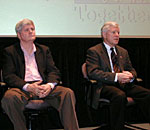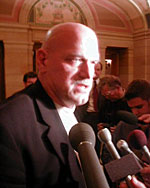By Tom Scheck
Minnesota Public Radio
December 5, 2001
|
| RealAudio |
Legislative leaders have started highlighting their proposals to fix the state's nearly $2 billion budget shortfall. Caucus leaders spoke at the Association of Minnesota Counties' Annual Conference in St. Paul. They say they will wait for Gov. Ventura to outline a plan that could help balance the budget, but started making recommendations which include raising taxes and cutting services.
| |
|
|
|
||
Senate Majority Leader Roger Moe and Senate Minority Leader Dick Day joined House Speaker Steve Sviggum and House Minority Leader Tom Pugh at the RiverCentre in St. Paul to discuss the state's revenue forecast.
They told the crowd of county adminstrators and commissioners they're concerned about the budget shortfall, but won't call the situation a crisis. They say they'll withhold that claim until the next revenue forecast is announced in February.
All of the lawmakers had at least one suggestion to fix the problem. Some said they wanted to make sure there weren't significant cuts to certain programs.
Republican Sviggum says he won't stand for any cuts to education or long-term care. Pugh says his House DFL caucus will try to protect education spending. DFLer Moe says lawmakers and Gov. Ventura have to be open to any and every suggestion.
| |
|
|
|
||
"Nobody is going to get their way. You can't just say, 'We're not going to do anything on the expenditure side,' or 'We're not going to do anything on the tax side.' It's not going to work out that way. It's going to demand everyone showing some flexibility and there's no question the governor is going to have to lead the way here, Moe said."
Moe said he'll champion an increase in the state gasoline tax. He said gas prices are less than $1 per gallon in some areas of the state and doesn't think consumers will notice the price difference.
Pugh and Day say the gas tax is a possibile solution while Sviggum opposes the proposal.
Sviggum says he doesn't support any tax increases. He says he'll suggest the state institute a hiring freeze on state employees except in public safety and health care.
"If there was one action item, right now I would tell the governor to start preparing for reducing our state workforce through attrition. Don't lay anybody off, we're not going to lay anybody off, nobody is going to lose their job," he said.
Sviggum says the state shouldn't replace jobs when a state employee retires.
Lawmakers also say the state could create more public works projects next session to help bolster the economy and increase the state's workforce. However, they disagree on the price tag. Sviggum suggested a $500 million capital bonding bill, while fellow Republican Day said he'd support a $1.5 billion bonding bill as long as the projects could be started immediately.
Day also said he wants to use lottery funds and money earmarked for the Stillwater bridge for transportation funding.
"I will have a bill to use 30 percent of the lottery fees for transportation. I will have a bill to make $125 million that we've set aside for the St. Croix bridge to put into transportation and make the St. Croix bridge a toll bridge," said Day.
Lawmakers said that in order for any of these proposals to move forward, Gov. Ventura needs to extend an olive branch to state lawmakers.
| |
|
|
|
||
Pugh said Ventura has to stop attacking lawmakers, the press and the public. "If we're chopping at each other, if the governor thinks we were the cause and he'll try to turn it that way I would expect. I'd hope that we could overcome that. Unless we're pulling together with him leading the charge, this is really going to be ugly," Pugh said.
Gov. Ventura's press secretary, John Wodele, said Ventura has worked with lawmakers in the past and says he'll continue to do so throughout his term. He says Ventura is open to all suggestions to fix the deficit but maintains Ventura is more likely to cut the budget before raising taxes. He notes Ventura has already begun speaking with legislative leaders.
"He's going to start his conversations and planning with legislative leaders today. That sort of flies in the face that he doesn't cooperate when they say he doesn't cooperate with the legislature and they'll be discussing possibilities that exist in terms of process. A special session would be on the table for discussion," according to Wodele.
While the three parties say they'll work hard to fix the problem, there could be some finger pointing along the way. House Majority Leader Tim Pawlenty is a Republican candidate for governor and Senator Moe has said he's considering a run for Ventura's job as well. Moe says he'll hold committee hearings immediately to examine how last year's tax cuts contributed to the state's revenue shortages.
More from MPR


